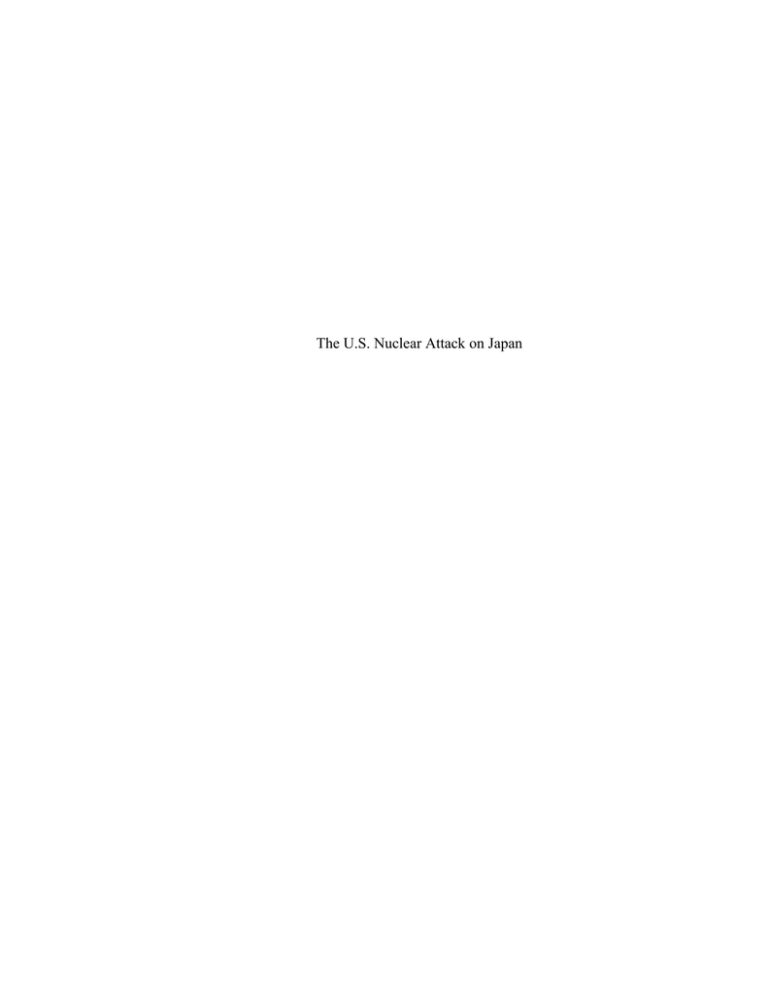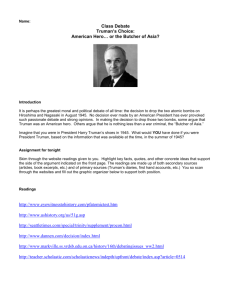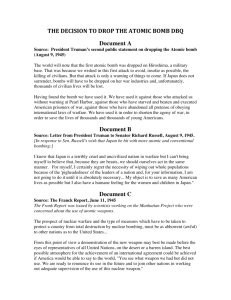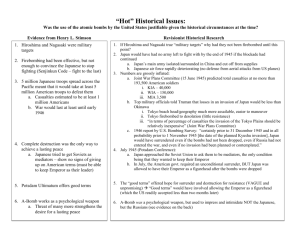final paper - ESL 100
advertisement

The U.S. Nuclear Attack on Japan Wenlong Ji Teddy Chocos English 100 D/E 12/10/14 The 20th century witnessed two world wars and the only use of nuclear weapons for warfare on earth so far. In the summer of 1945, in order to end the Second World War, the United States dropped two atomic bombs in two Japanese cities, killing hundreds of thousands people. Although it has been a decision of controversy ever since as the majority of the victims were civilians, it on the other hand successfully fulfilled the Allies’ strategic goal, which was to stop the fruitless and stupid defense of the Japanese armies once and for all. Otherwise, it could have cost even more soldiers’ lives on both sides and leave more Japanese cities destructed as the Pacific War dragged on. Many of the criticisms fell on not only President Truman’s decision to drop the bombs, but also on the development of the weapon itself to start with. However, as we shall see, it was the result of a great scientific discovery that happened to be made during a time when military defense was key to many nations’ survival. In the last month of 1938, a German scientist discovered nuclear fission, and in a month later, its theoretical explanation was also provided, making it ready for mankind to deliberately produce nuclear reaction. This scientific advance came at such an important moment when national defense was so crucial to most of the countries in the West that in order to gain the final victory they were willing to pay any price. As Churchill claimed in his first address as Prime Minister, “You ask, what is our policy? I will say: It is to wage war, by sea, land and air, with all our might and with all the strength that God can give us... You ask, what is our aim? I can answer with one word: Victory - victory at all costs, victory in spite of all terror, victory however long and hard the road may be; for without victory there is no survival.” The Second World War, at that time, was a life-or-death problem facing many of these European countries. It was not only a race on the combating field between the Axis powers and the Allied, but also a race between the research labs on both sides in terms of weapon development. Under this circumstance, any technology that could help in warfare inevitably became the top priority. In particular, the development of nuclear power and its use in actual warfare accelerated when the United States, one of the most scientifically advanced countries, got involved in the war by Japan's attack on the Pearl Harbor. Indeed, the major powers at the time all recognized the importance of nuclear power and were acting fast. A few months after its discovery, the United States initiated a research and development project, later called “the Manhattan Project,” to produce nuclear weapons, even before it had anything to do with the war that was going on. At the same time, unsurprisingly Germany started their nuclear weapon project as well. Luckily, it was the U.S. who succeeded in their efforts first, when a nuclear device was detonated in New Mexico in July, 1945. People today sometimes reproach the scientists for working in these laboratories and helping develop such a destructive weapon, but as J. Robert Oppenheimer—the scientific director of the Los Alamos National Laboratory that actually designed the bombs—argued in a speech at Los Alamos, “The reason that we did this job is because it was an organic necessity. If you are a scientist you cannot stop such a thing. If you are a scientist you believe that it is good to find out how the world works; that it is good to find out what the realities are; that it is good to turn over to mankind at large the greatest possible power to control the world and to deal with it according to its lights and values.” Therefore, the development of nuclear power was a necessity in terms of scientific progression, and its development into a military weapon was a necessity in terms of national defense strategy at the time. With such a strong weapon in hand, the question then becomes whether the U.S. was justified to use it towards the end of the World War II when it was almost sure that the Allies would win. One thing to notice is that in fact, Truman, the U.S. president at the time, had tried very hard to avoid its use from the beginning. It was Japan who surprisingly attacked the U.S. naval base at Pearl Harbor first, which led to America’s participation in the war, causing tens of thousands of deaths of American soldiers in the years to come. Towards the end of the war, while Nazi Germany surrendered in May 1945, Japan, seeing no signs of a potential victory, still refused to offer to surrender unconditionally. The U.S. even warned Japan in the Potsdam Proclamation that it would take actions of “prompt and utter destruction” of the country if the Japanese emperor continued to fight at the cost of its own people. However, the stubbornness of the emperor and his refusal to surrender left no choice for Truman but commanding the drop of two bombs on Hiroshima and Nagasaki. In Truman’s letter to Senator Richard Russell, who wished for even more atomic and conventional bombing of Japan to follow, he confessed his own intention that "for myself, I certainly regret the necessity of wiping out whole populations because of the 'pigheadedness' of the leaders of a nation and, for your information, I am not going to do it until it is absolutely necessary...” Indeed, during the discussions among him and the other military leaders of the U.S. on what targets to select for the bombing, they intentionally crossed Kyoto out, an old center of Japanese civilization, in order to preserve the cultural heritage there. Still, they felt it was the necessary move not only because of Japan’s refusal to surrender but also because of the realization that the original plan with an invasion into the Japanese mainland proved to be too costly for Americans. The battle at Iwo Jima was a lot more brutal than expected, and too many American soldiers sacrificed their lives there, to the extent that the Navy Secretary James Forrestal believed at the time that they could not “go from Iwo to Iwo” and they “must find a formula to gain peace without this frightful bloodshed.” Thus, Truman went for the atomic bombs as a last resort “in order to shorten the agony of war, in order to save the lives of thousands and thousands of young Americans” “against those who attacked us without warning at Pearl Harbor, against those who have starved and beaten and executed American prisoners of war, against those who have abandoned all pretense of obeying international laws of warfare.” It destroyed two cities and killed many people, but it could probably have cost more lives if more combats like Iwo Jima took place. Strategically, the drop of the bombs was successful. First it succeeded in its intention to draw an end to the Pacific War. On the day next to the second bombing, Japan made an offer to surrender to the Allies finally, after witnessing the intimidating power of the explosion. Second, America became the winner of the Second World War, owning the most powerful weapon in the world and possessing the strongest economy at the time. The dramatic effect of this new weapon also empowered the American people with a confidence of the supremacy of their mother country that remained unshattered for half century until the 911 incident. Last but not least, the emergency of the nuclear weapons turned out to be an effective last card on negotiation tables, which in a way prevented wars from happening. It did not necessarily bring about the doomsday as many people worried after the bomb drop in Japan—in fact, it was the first but also the last use since then. General Leslie Groves put it well in his lecture, saying that “It provides an overwhelming inducement for the avoidance of war. It emphasizes the crisis we face in international matters and strengthens the conviction that adequate safeguards for peace must be found.” In conclusion, the nuclear attack on Japan in August 1945 ended the war of the largest scale ever in human history in a way that changed dramatically world politics. To the United States, it was a move that effectively protected its people from sacrificing in the fight with the Japanese enemies, and by showing the security this country was both able and determined to provide to its own people, marked its emergence to the center of the world power. Security is important towards the safety of American from Japanese Enemies attack. Work citation "Dissociative Entanglement: US–Japan Atomic Bomb Discourses by John Hersey and Nagai Takashi." UMB. Healey, 21 Apr. 2012. Web. 21 July 2014. "Harry S. Truman Library and Museum." Harry S. Truman Library and Museum. N.p., n.d. Web. 13 Dec. 2014. "The Politics of Forgetting: Otto Hahn and the German Nuclear-Fission Project in World War II." UMB. Healey, 5 Feb. 2002. Web. 7 Aug. 2014.





